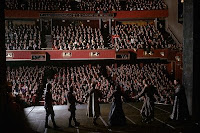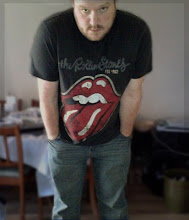 “Some things are just designed to be read aloud I guess.”
“Some things are just designed to be read aloud I guess.”That was a comment from one of my year 12s earlier. And it was one of several events which restored my faith in Literature this week – well, maybe ‘restored’ is the wrong word; maybe ‘reaffirmed.’
Shakespeare’s Sonnet 18. Don’t tell anyone but I’m a sucker for a good sonnet. Even one as popular as #18 - Shall I Compare Thee to a Summer’s Day. Normally I try to forgo the popular choice in favour of a path less trod but I like this one.
Of course I got the usual groans when I handed out copies to my year 12 literature class. They tell me they’re not Shakespeare fans. They tell me that they find his language a barrier rather than a selling point. They tell me he is rammed down their throats so much that they can hardly breathe and they feel under undue pressure – that if they don’t like the bard they believe they are seen as lesser beings. I try to understand, but I can’t empathise. After they read through this particular poem, making first impression annotations, their mood was no better.
“It’s gay!” announced one of my more vocal girls. “If some lad said something like that to me I’d finish with him there and then.” There was general murmured approval and so she continued, “I’d worry greatly about his sexuality.”
“Because he writes poetry?”
“Because he wrote a poem about a type of love that doesn’t exist. It’s sickly sweet and unrealistic”
I found it hard to argue against that – so instead I took them through the poem a bit at a time and looked at the mechanics – I find this an uninspiring task but it has to be done. And finally, as a parting gesture I read it aloud – well, I didn’t read it; I recited it. Eye contact makes a big difference you know. I gave it everything. I put my all in to it. I gie ‘er Dixie.
I’m not going to tell you I am a good reader, I am under no illusion that my public speaking is anything other than average; but twelve lines in I paused, looked them in the eye, and read the last couple of lines,
As long as men can breath, or eyes can see,
So long lives this, [dramatic gesture towards the poem projected on the wall behind me]
And this, gives life to thee.
Then silence. Everyone was looking at me - it was unnerving. The silence seemed to last an age. Then a collective exhale. They were rapt. I think I may even have heard a slight "awww" coming from one of the rugby players sitting at the back of the room.
Of course it was all ruined when I pointed out it was written to a young man and the rest of the lesson descended into a debate about whether Shakespeare was gay or not. Well at least I had them for a moment.
Do they love Shakespeare now? Not even a bit. But they enjoyed that one little bit of Shakespeare. I think it helps when you understand that he understands us. Wow that last sentence was pretentious – superb!

 I was chatting with my form class today. They’re an amiable bunch of 17 year olds, and I get on well with them. We don't tend to get into too many deep and meaningful conversations - usually.
I was chatting with my form class today. They’re an amiable bunch of 17 year olds, and I get on well with them. We don't tend to get into too many deep and meaningful conversations - usually.




















